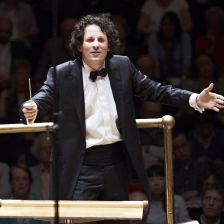 Alexandre Bloch led the VSO.
Alexandre Bloch led the VSO. Of course, there’s nothing wrong with such a program. A “run-of-the-mill” concert with an overture-concerto-symphony format can be an excellent thing if it’s played by a first-rate orchestra that treats everything it plays as vital and compelling. That is what a first-rate orchestra does, every time it walks out on stage. But it is not what the Vancouver Symphony did.
From the opening of Schumann’s Manfred overture, balance was unbalanced, precision was imprecise and control was out of control. Entries were jagged, phrasing was rough-hewn and the sections of the orchestra seemed to be competing with each other, rather than working together towards a common purpose. From the podium, Bloch seemed unable to reign in the musicians he was nominally leading.
I was reminded of a review of the VSO that I wrote a few years ago, the last time I was in Vancouver. (See here.) At the time, I noted the orchestra’s “energy and enthusiasm,” while adding a caveat about the absence of a “subtle or well blended tone-palette.” Last Friday’s concert makes me wonder if this is a problem that has been getting worse, not better.
Prospects improved with the arrival of Biss on stage, for Mozart’s Piano Concerto No. 21. And, to be sure, the American pianist played with clarity, delicacy, sure-fingered dexterity and other musical virtues that had been sorely lacking thus far. However, there was a bluntness to the orchestral tuttis that contrasted with Biss’s sophisticated interpretation – and not in a good way.
It wasn’t until the final piece – Haydn’s Symphony No. 92 – that Bloch and the VSO managed to pull together a performance worthy of a major orchestra. Indeed, the transformation was remarkable. In the first movement, Bloch introduced some effective dynamic contrasts – and now the musicians were with him. The slow movement was pleasantly calm an fluid, and the minuet was cleverly animated by surprisingly emphatic off-beats. The symphony concluded with a finale that was fresh an energetic.
The good news is that this program improved as it progressed, with the orchestra eventually playing at its best. But the bad news is that no concert ever gets a second chance to make a good first impression. The VSO’s playing at the outset left me with the impression that the orchestra’s new conductor, Otto Tausk, will find that bringing consistency and discipline to this ensemble may prove to be quite a challenge, when he takes over next year.
© Colin Eatock 2017
 RSS Feed
RSS Feed

